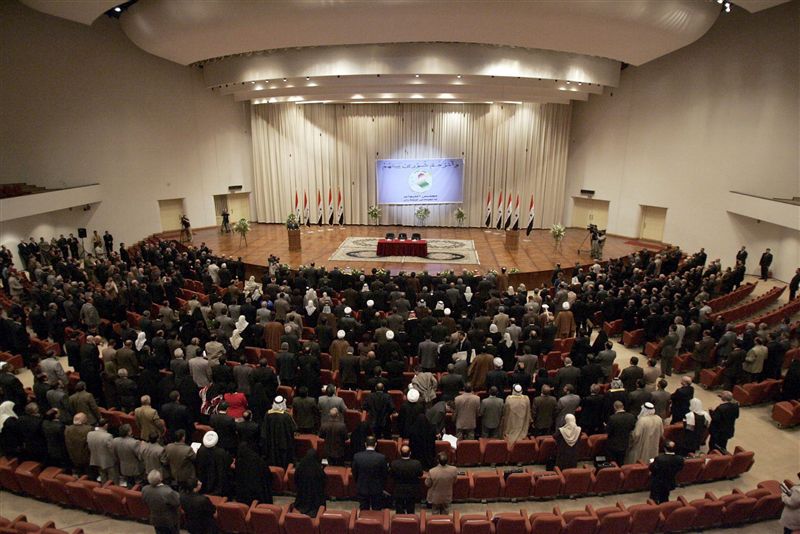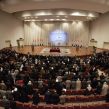
The Politics Behind Iraq’s Second Parliamentary Election
Publication: Terrorism Monitor Volume: 8 Issue: 3
By:

Iraqis will head to the polls on March 7 in the second parliamentary election since the overthrow of Saddam Hussein in 2003. Iraqi politics are in a state of flux that is reflected in the run-up to the vote. The election law was held up over longstanding issues like Kirkuk. At the same time, the ethno-sectarian parties that dominated the 2005 polls are being challenged by a new wave of nationalist parties. This has created challenges to forming a state ruled by law, given tensions between the new parties and the old lists that are attempting to hold onto power.
Iraq’s parliament passed a new election bill on December 6, 2009. Three days later, the three-member Iraqi Presidential Council approved the legislation and it became law (Aswat al-Iraq, December 9, 2009). That was almost two months past the original deadline of October 15, 2009 set by the Iraqi Election Commission (RFE/RL, October 7, 2009). The original version of the law was passed by parliament on November 9, 2009 after long arguments. [1] One of the disputes was over what type of voter system to use. An open list was chosen where the public is able to pick from parties, lists, and politicians. Due to disputes between Kurds, Arabs, and Turkmen, voting in Tamim province (which includes Kirkuk) was made provisional for one year while a committee looks for any irregularities that could invalidate the balloting (Aswat al-Iraq, September 24, 2009). Finally, the number of seats up for grabs was increased from 275 to 323, based upon population numbers from the Ministry of Trade and a requirement that there be one seat in parliament for every 100,000 people (Niqash.org, November 9, 2009).
Iraq seemed to be ready for the polls when Vice President Tariq al-Hashimi vetoed the first draft of the bill on November 18, 2009. Al-Hashimi objected to the fact that Iraq’s refugees, mostly from his Sunni constituency, would have their votes go towards only eight compensatory seats shared with smaller parties that did not get enough ballots at the provincial level, but did well nationally. [2] This backfired when the Kurdish Alliance, backed by Prime Minister Nuri al-Maliki’s State of Law coalition and the Islamic Supreme Council of Iraq (ISCI), ignored al-Hashimi’s concerns and amended the law to reduce the number of available seats in parliament by basing them upon older 2005 statistics with a 2.8% increase for recent population growth. [3] This reduced the number of seats in many Sunni areas while increasing them in Kurdistan. That dilemma was finally worked out on December 6 by giving every province an increase in seats, including three in Kurdistan, and allowing refugees to be counted as part of their home provinces. The new number of seats in parliament is now set at 325. [4]
The Iraqi Election Commission then set the voting date for March 7, 2010 (Aswat al-Iraq, December 9, 2009). This will cause legal problems as the constitution says that elections should be held no later than January 31, 2010 and parliament’s term ends March 15, 2010 (Reuters, December 7, 2009). It is expected to take months to put together a new government, so some sort of caretaker administration will have to be assembled in the meantime.
With the election law finally passed, Iraq’s many lists are left to focus upon their campaigns. In 2005 there were three main ethno-sectarian lists competing:
• The Shiite United Iraqi Alliance, made up of the Supreme Council for the Islamic Revolution in Iraq (SCIRI, now ISCI), the Sadrists, and the Dawa Party.
• The Kurdish Alliance, consisting of the Kurdistan Democratic Party (KDP) and the Patriotic Union of Kurdistan (PUK).
• The Sunni Iraqi Accordance Front, consisting of the Iraqi Islamic Party, the General Council for the People of Iraq and the Iraqi National Dialogue Council (BBC, January 20, 2006).
By 2009 almost all of those alliances had broken apart and there is now a mix of ethno-sectarian and nationalist lists running for office. [5]
The Shiite bloc for example, has split into two. Prime Minister al-Maliki’s Dawa Party formed the State of Law coalition for the 2009 provincial elections. The coalition calls for a strong central government and better security. The ISCI, the Sadrists, former Prime Minister Ibrahim Jaafari’s National Reform Trend and Ahmad Chalabi’s Iraqi National Congress created the Iraqi National Alliance (INA). Since they have disparate views on many issues, the INA’s main selling point is its Shiite identity. Iran played a large role in its formation in an effort to maintain Shiite power in Iraq. [6] Tehran and the INA also wanted al-Maliki to join because he is the most popular politician in Iraq, but they did not want his leadership and refused to assure him the prime minister’s post. [7] The two lists are likely to get the most votes from the Shiite majority, but because of their split neither may even get a plurality. There are constant hints and rumors that the two may rejoin after the voting (Alsumaria TV, January 7).
The other major list is the Kurdish Alliance of the KDP and PUK. They and their constituency are still rather homogenous, which means they will probably get about the same number of votes as in 2005, when they received the second-highest number of seats after the United Alliance. In 2010 this means they will be looked at as the main element in the formation of any new coalition. The Kurdish Alliance will be asking for the retention of ethno-sectarian quotas that assure a Kurdish president and deputy prime minister in the national government, concessions to allow them to export oil, and a resolution to the Kirkuk issue. Their most likely partner is the National Alliance since the Kurds and the ISCI have a long-standing relationship predating the U.S. invasion, but this relationship is complicated by the fact the Sadrists are not friendly to Kurdish demands.
After these three larger lists, there are several medium-sized groups:
• The Iraqi National Movement coalition, which includes former Prime Minister Ilyad Allawi’s Iraqi National List, Vice President Tariq al-Hashimi’s Renewal List and Saleh al-Mutlaq’s Iraqi National Dialogue Front. On January 8, the Accountability and Justice Commission (successor to the De-Baathification Commission) banned al-Mutlaq from participating in the election, accusing him of being a Ba’athist. [8] Al-Mutlaq ran in the 2005 election, where his party garnered 11 seats, and he also helped draft the 2005 constitution (McClatchy, January 7). The Commission has questionable legal standing and its decision to ban al-Mutlaq could disrupt the voting, as other members of the list have threatened a boycott in response. It would also set a bad precedent if the Commission were able to ban parties that have actively been involved in Iraqi politics with no previous problems.
• The Unity of Iraq Alliance is made up of Interior Minister Jawad al-Bolani’s Constitution Party and Iraq’s Awakening Conference, led by Anbar governate’s Shaykh Ahmad Abu Risha (Aswat al-Iraq, October 21, 2009). Bolani has been mentioned as a possible candidate for prime minister, but his party has never done well in elections.
• The last significant list is the Iraqi Consensus, which is led by the Iraqi Islamic Party. [9] It is the successor to the Iraqi Accordance Front.
Most of these lists are more nationalist and secular in orientation than ethno-sectarian. Their real importance will be seen after the votes are tallied and the large parties need to put together ruling coalitions. These medium-sized lists will be crucial in getting the required number of seats to rule, and will be offered ministries as a reward for their support.
Conclusion
Iraq’s 2010 election is likely to bring about both change and stasis. The 2009 provincial elections showed that voters were more interested in issues like security, services, and nationalism than ethno-sectarian identity. The 2010 vote will continue that trend, as there are more serious secular contenders this time around. At the same time, groups that still hold onto identity politics (like ISCI and the Kurdish Alliance) will have enough power to upset any broad consensus on Iraq’s major issues, such as the implementation of federalism or the development of the oil industry. This was demonstrated when the Kurdish Alliance and their ISCI allies were able to hold up the election bill over Kirkuk and a closed list. The voting is also causing legal problems, as the Accountability and Justice Commission is attempting to ban parties just prior to the vote and the delay in passing the election law means that constitutional deadlines will be broken and a caretaker government will have to be formed. These are all important developments for Iraq’s nascent political system. New voices are emerging, and some of the old ones are trying to intimidate them. This, along with the inability to follow deadlines, even ones set in the constitution, will test the resiliency of Iraq’s government ability to move towards a more open system.
Notes:
1. Reidar Visser, “The Election Law Is Passed: Open Lists, Kirkuk Recognized as a Governorate with ‘Dubious’ Registers,” Historiae.org, November 8, 2009.
https://historiae.org/election-law.asp
2. Reidar Visser, “Constitutional Disintegration,” Iraq and Gulf Analysis, November 19, 2009.
https://gulfanalysis.wordpress.com/2009/11/19/constitutional-disintegration/
3. Reidar Visser, “The Hashemi Veto Backfires, Parliament Ups the Ante,” Iraq and Gulf Analysis, November 23, 2009.
https://gulfanalysis.wordpress.com/2009/11/23/the-hashemi-veto-backfires-parliament-ups-the-ante/
4. Reidar Visser, “No Second Veto: The Election Law is Approved by Tariq al-Hashimi and the Iraqi Presidency,” Historiae.org, December 6, 2009.
https://www.historiae.org/hashemi.asp
5. Marisa Cochrane Sullivan, “Iraq’s Parliamentary Election,” Institute for the Study of War, October 21, 2009.
https://www.understandingwar.org/backgrounder/iraqs-parliamentary-election
6. Jeremy Domergue and Marisa Cochrane, “Balancing Maliki,” Institute for the Study of War, June 2009.
https://www.understandingwar.org/report/balancing-maliki
7 Nimrod Raphaeli, “Al-Maliki Turns His Back on Iran, Embraces Iraqi Nationalism,” Middle East Media Research Institute, September 2, 2009.
https://www.memri.org/report/en/0/0/0/0/112/0/3619.htm
8. Reidar Visser, “Why Ad Hoc De-Baathification Will Derail the Process of Democratization in Iraq,” Iraq and Gulf Analysis, January 8, 2010.
https://gulfanalysis.wordpress.com/2010/01/08/why-ad-hoc-de-baathification-will-derail-the-process-of-democratisation-in-iraq/
9. Ahmed Ali, “Iraq’s Elections Challenge: A Shifting Political Landscape,” Washington Institute for Near East Policy, November 20, 2009.
https://www.washingtoninstitute.org/templateC05.php?CID=3145





